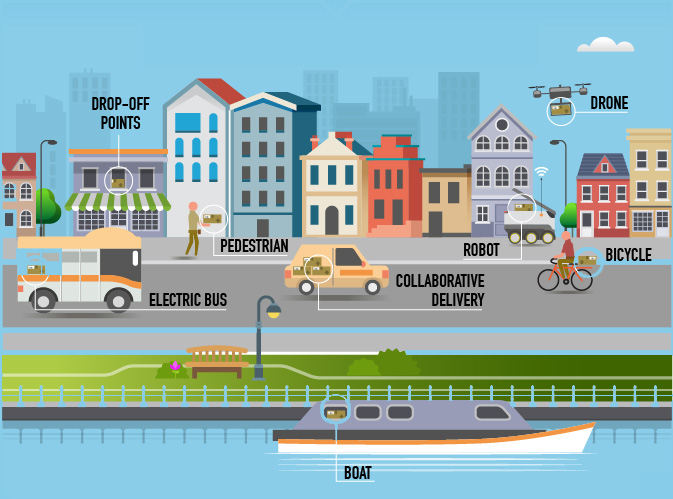Thought Leadership Corner: RISING DELIVERY COSTS ARE THE PRIME TARGET
Once upon a time, back in the early days of online shopping, free delivery was used as a loss-leader by retailers who wanted to acquire new customers. It was soon the default setting; no one charged for delivery. In fact, when I was a technology journalist back in the late 1990s, it even caused a stir when a B2B ecommerce company started charging for delivery.
That’s how startling the idea of charging for delivery had become in just a few short years. It’s not surprising really - it had been given away free for so long that it had lost all perceived value as far as customers were concerned.
Fast forward to late 2017 and I find myself thinking about that old French saying, plus ça change, plus c'est la même chose*.
That moment of reflection was prompted, of course, by the news that Amazon is changing its delivery charges. Unless you’ve been avoiding the news - and who could blame you if you have - you’ll already know the details: Prime Now members have to meet a new minimum order threshold (£40 rather than £20) to get free delivery, otherwise there’s a £3.99 charge applied.
There’s been uproar on Twitter, naturally, with some disgruntled Prime members accusing Amazon of being ‘sneaky’, among other more colourful things.
I don’t often feel a great deal of sympathy for Amazon. But I think there are some important points to consider in this development that go beyond accusations of sneakiness.
One of those considerations is this. If I’d asked you just a few years ago if you’d like to be able to buy something online and have it delivered in under two hours (sometimes in less than one) for just £3.99 you’d have almost certainly said yes. The service Amazon offers is impressive and £3.99 isn’t a huge sum of money. Although we should also remember the majority of the UK doesn’t have access to Prime Now. Indeed, there are bound to be plenty of people living in out in the wilds who’d love the opportunity to hand over £3.99 in exchange for super-fast delivery.
The other thing I am reminded of is that point I made a little earlier about the perception of value. As a race of beings, humans have been great at adapting to changing surroundings. That gave us an evolutionary advantage, but it’s also why we soon regard occasional treats as a new minimum level of acceptable standards; if the wi-fi on the plane stops working, someone on your flight will really start to grumble, even though the ability to send and receive emails while travelling at 500 Knots (that’s about 600mph / 965kph) is as close to black magic as you’re likely to get.
If there’s one thing the Amazon Prime Now delivery threshold and charge demonstrates it is that offering free delivery isn’t sustainable over the long-term. Not unless you are going to offer customers a slow and disappointing service.
To offer a range of days/times/locations, along with notifications and tracking is a costly affair. There is now a much wider acceptance from customers, particularly younger ones, that premium delivery options come at a price. Why is that? Because those customers are buying convenience and time equals money. The value trade-off is apparent, so the cost is palatable.
But the rest of the delivery market is facing increasing cost and margin pressures, even if the services they offer aren’t at the premium end of things.

Something will have to give. That was one of the earliest realisations I had when I first began writing about the business of delivery in the ecommerce sector; customers expect a range of increasingly sophisticated services to be offered at little or no cost. That’s a predicament that is felt even more keenly during very busy periods, like the one we’re in right now.
Volumes increase, often as a result of price-promotions, and customers are often in a hurry to get their purchases - it gets progressively worse as Christmas gets closer. But you didn’t need me to tell you that.
All-in-all, it simply isn’t sustainable; something has to change.
* - the more things change, the more they stay the same. Or ‘same old, same old’, if you prefer.
Picture credit: Michelin Solutions
Sebastian Steinhauser, CEO & Founder at Parcelly adds: 'Ever since launching Parcelly back in 2014, we firmly believed in the fact that consumers are willing to pay more for quality products and services which ultimately offer control, convenience and certainty, while also improving the environmental impact of last-mile delivery. This peace of mind being especially important to Online shoppers that are depending on the respective Online Retailer’s delivery options at check out.
Rising parcel volumes and pressures on logistic margins and existing fulfilment solutions naturally trigger bottlenecks within the first-and-last mile, and Parcelly as a third party service provider helps ease these pressures. We offer a sustainable omnichannel platform with a technology that can be integrated in any fulfilment process or opted into by consumers as and when required via our mobile app. Whether the costs of a personalised delivery experience or prime convenience are absorbed by the retailer or paid for by the consumer in the future, we believe customer satisfaction and a sustainable logistics environment is the ultimate goal and a price worth paying for.'
This website and its content is copyright of Parcelly - © Parcelly Ltd. 2017. All rights reserved. You may not, except with our express written permission, distribute or commercially exploit the content. Nor may you transmit it or store it in any other website or other form of electronic retrieval system.

